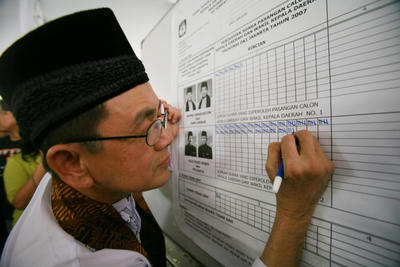As Jakarta is a diverse, cosmopolitan capital city representing the country’s heterogeneity, its gubernatorial election may be a gauge for the voting behaviour of the whole Indonesian population come the 2014 presidential election.
Joko ‘Jokowi’ Widodo and running mate Basuki Tjahaja Purnama were victorious in the first round of the election, winning 42.6 per cent of the vote, compared to the 34 per cent gained by incumbent Fauzi Bowo. This astonished many, as Bowo was widely expected to win the 11 July election. As the Widodo-Purnama team did not reach the 50-per cent threshold the law requires to automatically take the role of governor, a second round of elections will be held on 20 September.
The surprise triumph of Widodo and Tjahaja, who are Javanese and Chinese respectively, may signal a shift from the traditional notion that top posts must be held by someone of the local ethnicity (which in Jakarta is Betawi) and of the major religion (Islam).
The current gubernatorial election is perhaps the first where the contenders hail from such assorted backgrounds. Aside from Bowo, the incumbent governor, and Widodo, the popular mayor of Solo (Surakarta), contenders include Alex Noerdin, the governor of South Sumatra; Faisal Basri, an independent economist; and Hendardji Soepandji, a former army general. The ethnic and religious backgrounds of candidates and their running mates include Betawi, Javanese, Moluccan, Islamic, and Christian, among others.
This is interesting considering Jakarta’s demographics. Of its 10.1 million residents, 35.5 per cent are Javanese and 27.65 per cent are Betawi (native Jakartan), with other major ethnic groups including Sundanese (15.27), Chinese (5.53), Batak (3.61), and Minangkabau (3.18). Muslim is the majority religion, with 85 per cent of the population, followed by Christians at 10.7 per cent, Buddhists at 3.3 per cent, and Hindus at 0.2 per cent.
Religious and ethnic divides have long played into Indonesian politics. Jakarta has traditionally been a stronghold of the Prosperous Justice Party (PKS) — a moderate Islamic party with conservative influences — which gained 23 per cent of the vote and held the city-council majority in the 2004 legislative elections. When PKS supported Adang Daradjatun and Dani Anwar in the 2007 gubernatorial election, they went head to head — and lost by only a small margin — to Bowo. The fact that Bowo was backed by a coalition of 20 political parties, some of them major, demonstrates PKS’s strength.
Widodo’s Christian running mate Tjahaja may face legitimacy issues with the large bloc of voters influenced by PKS. Bowo also has a powerful main backer: the reigning Democratic Party, who won 33 and 35 per cent of the city’s votes in the regional and national legislative elections respectively in 2009. In addition, Bowo may win those constituents who consider that, as a Betawi, he has the legitimacy to lead Jakarta.
Bowo also received the official support of smaller parties, including a faction of the Christian Prosperous Peace Party (PDS). If the whole of PDS were to get behind Bowo, this would further undercut the votes Widodo and Tjahaja expect from Christian voters.
On the face of it, there is no major voting bloc readily available to Widodo and Tjahaja, who are only supported by the Indonesian Democratic Party of Struggle, and Gerindra. The combined vote of these two parties was only 15 per cent in Jakarta’s 2009 legislative elections.
This is why it is so surprising that the Widodo-Tjahaja team won such a large percentage of the vote. At 42.6 per cent, the pair clearly managed to appeal to voters across the racial and ethnic divide.
The win supports findings from research centre Kompas showing that Indonesian voters do not let ethnic affiliation dictate their choice of candidate. Significant proportions of each major ethnic group claim not to vote along ethnic lines.
Despite their strong results in the first round of elections, Widodo and Tjahaja’s challenge is not over. Negative campaigns intensified soon after the 11 July election. Racial and religious sentiments have been unleashed more vehemently in the city and online. Incidences of mosques warning constituents against choosing a non-Muslim as their leader have been observed across Jakarta.
As such, the September round of elections may importantly — and possibly more conclusively — determine whether the Jakarta electorate is ready to move beyond primordial sentiments and racial and ethnic cleavages.
Tobias Basuki is a researcher at the Department of Politics and International Relations, the Centre for Strategic and International Studies, Jakarta.

